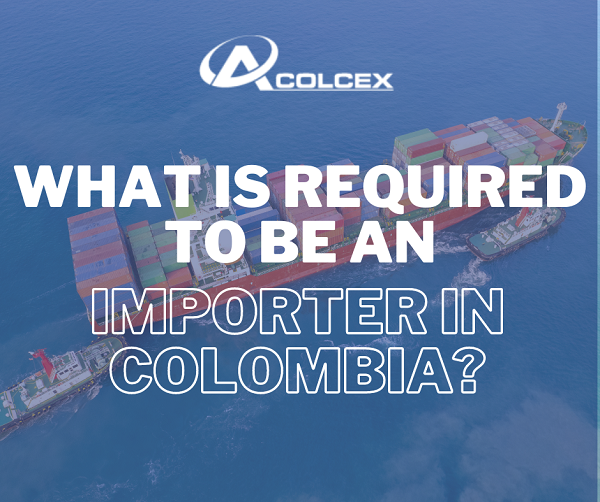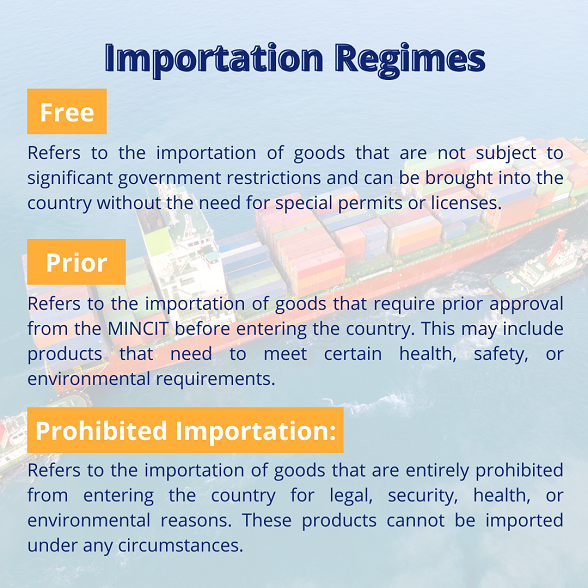Blog

WHAT IS REQUIRED TO BE AN IMPORTER IN COLOMBIA AS A NATURAL OR LEGAL ENTITY?
In Colombia, importing products involves meeting several essential requirements. These include being part of the common regime, registering with the Chamber of Commerce, obtaining the Unique Tax Registry (RUT), managing the import registration, verifying the tariff subheading of the desired product, and conducting international negotiations.
What is Importing and Why Do It?

Know the Regulations:
Thoroughly familiarize yourself with import regulations and norms in Colombia. Besides being essential for operating legally, understanding these regulations allows you to anticipate potential obstacles and adjust your business strategy accordingly. This entails becoming acquainted not only with Colombian customs laws but also with international trade policies that may affect your import operations.
1. Registration with the Chamber of Commerce:
Establish your business: If you're an entrepreneur considering venturing into importing, the first step is registering as a trader with the Colombian Chamber of Commerce. This registration is essential for anyone or any company wishing to conduct commercial activities in the country. You can do this registration online or by visiting one of the Chamber of Commerce branches.
2. Enrollment in the Unique Tax Registry (RUT):
Enroll in the Unique Tax Registry (RUT) of the DIAN. Here, you'll provide detailed information about your business, including tax and commercial data. This registration is mandatory for all companies and individuals engaging in economic activities in Colombia.
- Whether you're a natural person or a legal entity, you'll be able to include or remove natural or legal persons authorized with Code 22, Customs Representatives, in box 98 of the RUT. You can only do this if you have previously registered Code 22, Exporter, or Code 23, Importer, in box 54 of sheet 1 of your RUT. Another requirement is that in box 89 of sheet 2, you have one of the following codes: 61, OEA Exporter; 62, OEA Importer, or 89, Qualified User.
3. Registration with the DIAN:
Registration with the DIAN is the first step in formalizing your activity as an importer in Colombia. Obtaining your Tax Identification Number (NIT) not only enables you to carry out commercial operations legally but also grants you access to tax benefits and facilitates the filing of tax declarations and payments. It's important to keep your records updated and comply with tax obligations to avoid sanctions and legal issues in the future.
The Tax Identification Number (NIT) is like the tax "passport" of your business. You must obtain your NIT from the Directorate of Taxes and National Customs (DIAN). This number identifies you to tax and customs authorities and is necessary for conducting commercial operations.
4. Understand the Market:
To succeed in the Colombian market, it's crucial to understand the demands and trends of local consumers. Conduct thorough market research to identify market niches, analyze competition, and tailor your product offerings to the needs and preferences of the target audience. Stay updated on changes in consumer behavior and market trends to proactively adjust your import strategy. Deep market understanding enables you to make informed decisions and increase your chances of success in Colombia.
5. Determine the tariff classification:
After defining the product and its attributes, it's important to identify its tariff classification. This 10-digit code identifies the product internationally and is registered in Colombia's Customs Tariff. You can find this information on the DIAN website. If the product's classification isn't clear, you can make a specific inquiry to the DIAN, which incurs a cost equivalent to half the legal minimum monthly wage.
-
Good views or prior permits that must be processed as support for the import declaration. You may need to request authorization from the following entities: ICA, INVIMA, Superintendence of Industry and Commerce, Ministry of Transportation, Ministry of Agriculture, National Mining Agency, INDUMIL, AUNAP.
- The Import Regime. In Colombia, there are three import regimes: free, prior, and prohibited importation.

6. Fulfill Specific Requirements:
Lastly, ensure you meet all specific requirements for importing the type of goods you desire. This may include obtaining sanitary permits, quality certifications, special authorizations, among others. It's important to research and ensure compliance with all requirements before commencing your import operations.
- Complete Procedures in the Single Foreign Trade Window: Some freely importable products may require additional permits or authorizations. To do so, it's necessary to manage an import registration in the Single Foreign Trade Window (VUCE). Additionally, this platform also facilitates the processing of necessary authorizations for products requiring prior importation, issued by the Ministry of Commerce, Industry, and Tourism. Visit the VUCE virtual portal for detailed information on available procedures and how to carry them out.
7. Conduct Effective Negotiation:
It's important to establish the terms of negotiation. Obtaining supporting documents for the sale abroad and determining the responsibilities of both the buyer and the seller, including aspects such as the location of goods delivery, the scope of insurance, and transportation conditions are fundamental. According to information provided by the Bogotá Chamber of Commerce, "these conditions have been standardized by the International Chamber of Commerce in the INCOTERMS (International Commercial Terms).
Click on the following links for more information about INCOTERMS EXW - FCA - FAS - FOB - CFR - CIF - CPT - CIP - DPU - DAP - DDP.
8. Optimize Your Logistics:
An efficient supply chain is crucial for the success of your import operations in Colombia. This involves carefully planning each stage of the process, from acquiring products abroad to final delivery to the customer. Optimizing your logistics allows you to reduce delivery times, minimize transportation and storage costs, and improve customer satisfaction. Consider working with reliable logistics partners and using technologies such as shipment tracking and inventory management to enhance operational efficiency.
9. Currency Legalization:
Before making payment for the product, it's necessary to agree with the seller on the payment method, whether through a direct transfer or a bank transaction. According to Colombian regulations, all payments must be made using the financial system. Subsequently, once the foreign currency generated by the importation has been transferred abroad, a form must be completed with the Central Bank to legalize the outflow of funds.
10. Customs Clearance:
Specialized companies can be hired to carry out this process such as a customs broker, once the goods have been nationalized. These companies point out that it is a simple procedure, emphasizing the importance of having documentation in order. Likewise, it is crucial to define beforehand how the invoice should be in Colombia for its acceptance, the precise description of the goods, and the specification of the transport document. When presenting the goods to customs, the corresponding taxes are paid as established.
And there you have it! These are the basic steps to become an importer in Colombia. Remember that this process may take time and effort, but with patience and diligence, you can achieve your goal of becoming a successful importer in this beautiful country! If you have any questions or need assistance, don't hesitate to contact us at
